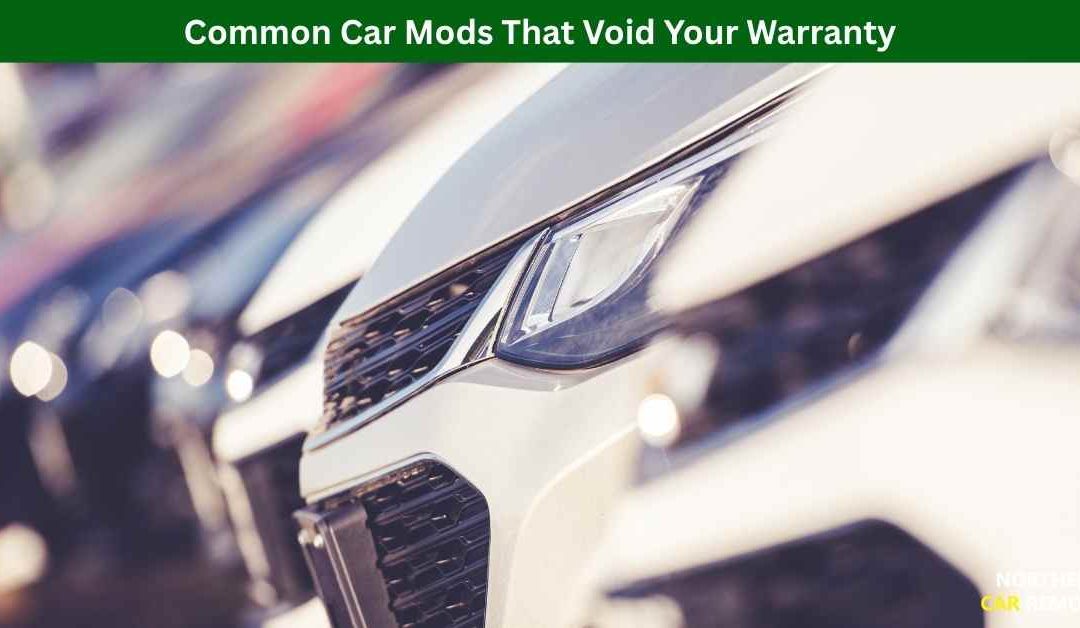Modifying your car can be a fun and rewarding way to personalise your ride. Whether it’s beefing up performance, changing the exhaust note, or simply upgrading the look — there’s no shortage of aftermarket parts and mods out there. But here’s the kicker: some of those modifications could void your manufacturer’s warranty faster than you can say “custom exhaust.”
We get it — customisation is part of car culture. But before you dive into mods, it’s important to understand which changes could leave you without warranty protection. Let’s break it down in a clear, no-nonsense way.
Why Does Modding Void Your Warranty?
In simple terms, a warranty is a promise from the manufacturer that they’ll repair or replace faulty parts — as long as you follow the rules. If you start modifying your car with parts or changes they didn’t approve of, and that modification causes a problem, they’re not covering the fix.
It doesn’t always void the entire warranty, but even if one system (like the engine) is affected, you’ll be footing the bill for repairs related to it.
1. Engine Tuning & ECU Remaps
One of the most popular performance mods — and one of the riskiest when it comes to warranties.
Reprogramming your car’s ECU (Engine Control Unit) for more power might give you a noticeable boost, but it also changes how the engine performs beyond factory specs. Manufacturers hate this because it can stress the engine, turbo, and transmission.
Real Example:
A customer in Melbourne brought in a Golf GTI with engine issues. Turned out they had an aggressive Stage 2 tune. The dealer spotted it immediately and declined the warranty claim on the turbocharger.
Verdict: High risk. Voids powertrain warranty in most cases.
2. Aftermarket Exhaust Systems
Upgrading your exhaust can change the sound and improve performance, but it’s not always warranty-friendly — especially if you delete the catalytic converter or modify emissions components.
If your new exhaust causes issues with sensors or emissions compliance, don’t expect a free fix under warranty.
Tip: Cat-back systems (which keep the catalytic converter) are usually safer than turbo-back or full systems.
3. Suspension Mods (Lowering or Lifting)
Whether you’re going for a sportier look or off-road capability, messing with suspension can cause trouble.
Lowering springs, coilovers, or lift kits can affect alignment, ride quality, and even drivetrain components. If something goes wrong — say, worn-out bushings or diff issues — the manufacturer might say your suspension mod is to blame.
Verdict: Any ride-height change increases risk. Suspension and drivetrain warranty could be affected.
4. Wheel and Tyre Upgrades
Swapping out your stock wheels for bigger or wider ones? It’s a common mod, but it can cause problems if not done right.
Larger wheels can affect speedometer readings, ABS performance, and place extra stress on your transmission and brakes.
Example: A Mazda CX-5 owner upgraded to oversized off-road tyres. Six months later, the gearbox started slipping. The dealer blamed the extra load on the drivetrain and refused the claim.
Verdict: Stick close to manufacturer-recommended sizes to stay safe.
5. Cold Air Intakes and Pod Filters
Aftermarket air intakes are popular for their sporty sound and minor performance gains. However, if they’re poorly installed or allow too much debris or water into the engine, you’re in trouble.
Dealers will often void engine warranty claims if they suspect a non-OEM intake caused engine damage.
6. Turbocharger and Supercharger Kits
Thinking about boosting your naturally aspirated engine with a turbo or supercharger? Be prepared to wave goodbye to your warranty.
These mods dramatically alter engine stress levels and require significant supporting upgrades. They almost always void engine-related warranties.
7. Interior and Electrical Mods
Installing aftermarket head units, reversing cameras, or interior lighting might seem harmless — but dodgy wiring can wreak havoc on your car’s electrical system.
Even minor mods can cause battery drain, sensor malfunctions, or infotainment glitches. If a fault arises and the dealer sees an aftermarket component interfering with the system, it may not be covered.
Verdict: Only use professional installers, and stick with quality brands.
What Doesn’t Automatically Void Your Warranty?
- Cosmetic changes like seat covers, floor mats, or wrapping your car
- Bolt-on accessories like roof racks (if properly installed)
- Reversible mods that don’t cause damage and can be undone before service
It all depends on whether the mod can be linked to the problem you’re claiming warranty for. If there’s no connection, you might be safe — but it’s still at the dealer’s discretion.
So, Can I Modify My Car or Not?
Sure — just be smart about it. If your car is still under warranty and you rely on that coverage, consider:
- Waiting until the warranty period ends
- Consulting the dealer before making changes
- Choosing factory-approved or dealer-installed accessories
- Documenting everything if you go ahead with mods
Before You Start Wrenching…
Modifying your car can be fun, but it’s important to weigh the pros and cons — especially when it comes to warranties. We’ve seen plenty of great cars brought to us for scrapping simply because a modification backfired and the repair costs weren’t worth it.
If you’re unsure whether a mod will impact your coverage, it’s always better to ask than assume. A quick chat with your dealer or mechanic can save you a heap of money (and headaches) down the line.
And hey — if you’ve got a car that’s already been heavily modified and you’ve hit a dead end with repairs or warranty claims, you can always reach out to us. We buy all kinds of vehicles, modified or not — and we’re happy to take the stress off your hands.
Happy driving, and mod responsibly!
If you are in Albanvale, and looking to sell your car, this is the best way to find us.
1/26 Acacia St, Glenroy VIC 3046
0437 773 905


Recent Comments